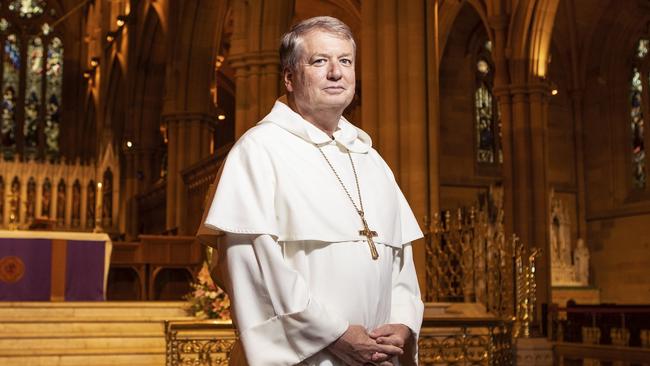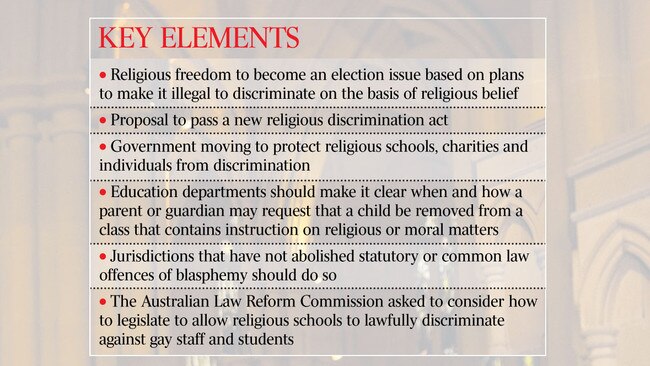Morrison’s stand on freedom of religion
Scott Morrison will take a religious discrimination act to the next election, in a major change to discrimination laws.

Scott Morrison will take a religious discrimination act to the next election, in a major change to commonwealth discrimination laws that will introduce, for the first time, stand-alone legal protections for Australians of faith.
The Australian can reveal the Prime Minister will today unveil the long-awaited review into religious freedoms conducted by former Liberal attorney-general Philip Ruddock and accept its centrepiece recommendation for a religious discrimination act.
The overhaul is aimed at ensuring religious discrimination is treated as seriously as racial or sexual discrimination, and will not pose curbs on free speech by avoiding replication of controversial provisions in section 18C of the Racial Discrimination Act.
Draft legislation for the shake-up will be released early next year and will include a provision for the creation of a “freedom of religion” commissioner to sit within the Australian Human Rights Commission.
The government will seek feedback on the draft legislation, which will make it unlawful to discriminate on the basis of an individual’s religious beliefs, before taking the overhaul to next year’s election.
In a key step, the government has also moved to defuse the parliamentary impasse over the treatment of gay students within religious schools by referring the issue to the Australian Law Reform Commission for review.

The Prime Minister told The Australian last night he was taking action because religion and faith were central to the lives of millions of Australians, their families and their communities.
“Australia is a secular democracy but that does not mean that Australians are a godless people,” Mr Morrison said. “Australians have a diversity of faith and religious backgrounds and these should all be respected.
“This is an essential part of multiculturalism, in the same way no Australian should be discriminated against for their ethnicity or sexuality. Protecting freedom of belief is central to the liberty of each and every Australian.”
The Catholic Archbishop of Sydney, Anthony Fisher, yesterday said a religious discrimination act was necessary because society had changed. “There have been attempts in some states to ban the sacrament of confession,” he said.
“There’s moves to remove the few existing religious liberty protections from our schools.
“There was an attempt to prosecute the Tasmanian Catholic Archbishop Julian Porteous for upholding Catholic teachings about marriage.
“A lot of other supporters of traditional marriage felt that they were, one way or another, discriminated against — including being sacked just for saying they supported traditional marriage.”
GRAPHIC: The Ruddock review and the way forward
Archbishop Fisher said Australians used to be “live and let live” on religious matters. “Our neighbours could have a different religion to us,” he said. “We gave each other the space to be different. But lately there has been a hard-edged secularism that wants to stamp out religion from public life. So that’s why I think there are calls today for religious discrimination legislation.”
The government has accepted absolutely or in-principle all 20 of the Ruddock review’s recommendations and will move to implement some changes more quickly than others. Mr Morrison and Attorney-General Christian Porter will today announce their intention to accept 14 recommendations immediately.
The Coalition government will seek to enact these recommendations through legislation when parliament resumes in February and views them as uncontroversial. They include measures such as an amendment to the Charities Act ensuring groups that uphold a traditional view of marriage are not stripped of their charitable status.
The Australian has confirmed that five of the Ruddock review recommendations dealing with exemptions in the Fair Work Act and existing anti-discrimination laws will be referred to the ALRC. These include the recommendations relating to students and teachers at faith-based schools.
Mr Porter said theALRC would be charged with devising a mechanism to balance the rights of gay students with the rights of religious schools, unless Bill Shorten accepted key government amendments.
“Labor’s refusal so far to accept religious-based schools should be allowed to impose what are known as rules of general application, or school rules, such as a requirement for all students to attend chapel, meant this issue could not be dealt with by parliament before the end of the sitting year,” Mr Porter said.
“If Labor is able to support the government’s amendments to ensure religious schools can educate within the doctrine and tenets of their faith, then this issue could be dealt with in the first sitting days of 2019.”
He also said there was no reason for any political party to oppose the introduction of a religious discrimination act. “I don’t see what arguments you would legitimately raise as to why we should protect people from discrimination based on their age, their race, their sex or the fact of a disability but not similarly protect them by virtue of the fact that they are a religious person,” Mr Porter said.
He said the government would not make it unlawful to “offend, insult or humiliate” someone on the basis of their religion — a move that would have replicated section 18C of the Racial Discrimination Act and has been attacked as an impediment to free speech.
Religious freedom expert Mark Fowler said the protection of people against discrimination on the basis of religious belief was “the missing piece in the constellation of Australian equality legislation … Of the five main equality rights recognised in the international law to which Australia is a signatory, being race, age, disability, sex (including sexual orientation) and religion, only religion fails to receive protection in commonwealth law.”




